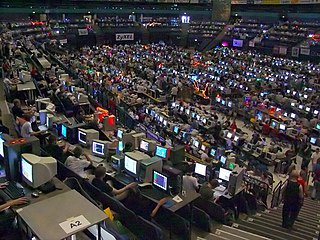This article has multiple issues. Please help improve it or discuss these issues on the talk page . (Learn how and when to remove these messages)
|
Farbrausch, or Farb-rausch, is a German group of demomakers.
This article has multiple issues. Please help improve it or discuss these issues on the talk page . (Learn how and when to remove these messages)
|
Farbrausch, or Farb-rausch, is a German group of demomakers.
The group became well known in the demoscene in December 2000 with a 64k intro called "fr-08: .the .product". The demo achieved its small size through the use of procedural textures, a custom MIDI-based software synthesizer V2 (controlled through a sequencer called Logic Audio), and a modified version of UPX executable compressor, [1] ".the .product" is an 11-minute 3-D show featuring complex scenes of computer generated imagery.
The name "Farbrausch" translates literally to "color rush", where rush means variously "intoxication, drunkenness, high, ecstasy, and state of euphoria." [2] This serves as a core theme across the otherwise multifaceted topics in Farbrausch demos, which cover futuristic or abstract technology, dystopian cityscapes and even quantum mechanics.
Their work has won numerous awards. In 2004, a subdivision of farbrausch called ".theprodukkt" released a 96 kB first-person shooter game named .kkrieger , and an earlier version of the tool they currently use to produce some of their demos, named ".werkkzeug", or "Tool".
Farbrausch give their releases a "product code", in the format "fr-0#". The numbers do not specify the order of release — the members have stated that they allocate the numbers as they start working on the project, not when they finish it. Non-serious releases receive negative numbers.
The group has periodically released improved compositions such as "fr-019: Poem to a Horse", "fr-030: Candytron" or "fr-025: The.Popular.Demo". The.Popular.Demo and debris. are among the most highly favored demos on the demoscene index, Pouet. The.Popular.Demo also received the "Public Choice Award" from the 2003 scene.org awards, and debris. won the 2007 scene.org award for best direction.
In 2009, Farbrausch released .detuned , an interactive demo for the PlayStation 3, again under the name .theprodukkt.
In 2012 Farbrausch released the source code of many of their demo tools on GitHub. [3]
| Title | Type | Awards |
|---|---|---|
| fr-05: Konsum | demo | 2nd place at Evoke 2000 |
| fr-06: Black 2000 | demo | 1st place at Dialogos 2000 |
| fr-08: .the .product (a.k.a. The Product) | 64kB intro | 1st place at The Party 2000 |
| fr-010: Art (in cooperation with Scoopex) | 64kB intro | 1st place at Mekka & Symposium 2001 |
| fr-011: ms2001 invitation | 64kB intro | 1st place at Mekka & Symposium 2001 |
| fr-012: kapital | demo | 4th at Mekka & Symposium 2001 |
| fr-013: Flybye | invitation intro | for The Party 2001 |
| fr-018: AGB | GBA demo | 1st place at Woest 2002 (wild demo) |
| fr-019: Poem to a Horse | 64kB intro | 1st place at Mekka & Symposium 2002, scene.org award nominee - best intro & best effects of 2002; the first demoscene production to be shown at SIGGRAPH |
| fr-020: In Control | demo | 3rd place at Mekka & Symposium 2002 |
| fr-022: Ein.Schlag | 64kB intro | 2nd place at Mekka & Symposium 2002 |
| fr-029: Dopplerdefekt | 64kB intro | 1st place at The Ultimate Meeting 2002, scene.org award nominee - most original concept of 2002 |
| fr-024: Welcome to... | 64kB intro | 2nd place at 0a000h 2003 |
| fr-025: The.Popular.Demo | demo | 1st place at Breakpoint 2003, scene.org award winner - public's choice of 2003, nominee - best effects, best demo, & best soundtrack of 2003 |
| fr-030: Candytron | 64kB intro | 2nd place at Breakpoint 2003, scene.org award winner - best intro of 2003 |
| fr-031: Faded Memories | demo | 12th place at Assembly 2003, scene.org award nominee - best graphics of 2003 |
| fr-034: Time Index (in cooperation with Haujobb) | 64kB intro | 2nd place at Simulaatio 2003, scene.org award nominee - best intro of 2003 |
| fr-036: Zeitmaschine | demo | 1st place at The Ultimate Meeting 2003 |
| fr-037: The Code Inside (in cooperation with mfx) | invitation demo | for Breakpoint 2004 |
| fr-038: Theta | demo | 2nd place at The Ultimate Meeting 2004 |
| fr-039: Collage Faction | wild demo | 2nd place at Breakpoint 2004 |
| fr-040 | pc 4k | 8th place at Breakpoint 2004 |
| fr-044: Patient Zero | 64kB intro | 1st place at Simulaatio 2005 |
| fr-045: Life After | demo | 11th place at Breakpoint 2005 |
| fr-046: Basso Continuo | demo | 4th place at Evoke 2005 |
| fr-048: Precision | 64kB intro | 4th place at Assembly 2006 |
| fr-049: Of Spirits Taken | invitation demo | for Breakpoint 2006 |
| fr-052: Platinum | 64kB intro | 1st place at The Ultimate Meeting 2006 |
| fr-041: debris. | demo | 1st place at Breakpoint 2007, scene.org award winner - best direction of 2007, nominee - best demo, best effects, public choice of 2007 |
| fr-055: 828 | demo | 1st place at Icons 2007 |
| fr-043: rove | demo | 2nd place at Breakpoint 2010 |
| fr-063: Magellan | demo | 1st place at The Ultimate Meeting 2010 |

Amiga demos are demos created for the Amiga home computer.

Demogroups are teams of demosceners, who make computer based audio-visual works of art known as demos. Demogroups form a subculture collectively known as the demoscene.

The demoscene is an international computer art subculture focused on producing demos: self-contained, sometimes extremely small, computer programs that produce audiovisual presentations. The purpose of a demo is to show off programming, visual art, and musical skills. Demos and other demoscene productions are shared, voted on and released online at festivals known as demoparties.

Future Crew was a Finnish demogroup that created PC demos and software, active mostly between 1987 and 1994.

The Assembly demoparty is an annual demoscene and gaming event in Finland. It is the biggest and the longest standing demoscene party. The Summer event takes place every year at Messukeskus in Helsinki, between late July and early August, and lasts three to four days. The 2020 edition was held online.
FastTracker 2 is a music tracker created by Fredrik "Mr. H" Huss and Magnus "Vogue" Högdahl, two members of the demogroup Triton who set about releasing their own tracker after breaking into the scene in 1992 and winning several demo competitions. The source code of FastTracker 2 is written in Pascal using Borland Pascal 7 and TASM. The program works natively under MS-DOS.

Breakpoint was an annual demoscene party held in Bingen, Germany during Easter from 2003 to 2010. The successor to Mekka & Symposium, an annual German demoscene party that had ended in 2002, Breakpoint grew to become the largest annual event focused solely on the demoscene. It attained over 1000 visitors at its height, attracting demosceners from Germany, Sweden, Finland, Poland, Spain, Australia, and Canada, among others. It was also the host of the Scene.org Awards ceremony from 2003 to 2010.

Second Reality is an IBM PC compatible demo created by the Finnish demogroup Future Crew. It debuted at the Assembly 1993 demoparty on July 30, 1993, where it was entered into the PC demo competition, and finished in first place with its demonstration of 2D and 3D computer graphics rendering. The demo was released to the public in October 1993. It is considered to be one of the best demos created during the early 1990s on the PC; in 1999 Slashdot voted it one of the "Top 10 Hacks of All Time". Its source code was released in a GitHub repository as public domain software using the Unlicense on the 20th anniversary of the release on 1 August 2013.

.kkrieger is a first-person shooter video game created by German demogroup .theprodukkt, which won first place in the 96k game competition at Breakpoint in April 2004. The game has never been fully released, remaining instead in the beta stage of development as of 2024, which renders it a perpetual beta.
Tristar and Red Sector Incorporated (TRSI) is a demogroup which formed in 1990. It came about from the longest-running cooperation in scene history. RSI existed from 1985, before being joined by the "T" later on. Evolving from the Commodore 64 to the Amiga and later to PC and various game console platforms - like the PlayStation, Xbox, Nintendo - and set-ups like Arduino, Android or Blu-ray, TRSI released a number of digital productions, dedicated to experimenting in phreaking or network alteration. Its members were spread around the world and still contribute to computer scene art and code after more than 27 years of history.

Scene.org is a non-profit organization, providing the currently largest demoscene file repository. It was founded in 1996 by Jaakko "Mellow-D" Manninen, though originally it existed as ftp.fm.org, an FTP-server for releases from the group Five Musicians. In 1997, it re-opened as Scene.org. After the Hornet Archive closed on September 22, 1998, scene.org became the only prominent demoscene-FTP available and quickly became the host of many other releases as well.

PlayStation Portable homebrew refers to the process of using exploits and hacks to execute unsigned code on the PlayStation Portable (PSP).

Jesper Kyd Jakobson is a Danish composer and sound designer who has worked on various video game, television, and film projects. He has composed soundtracks for the Hitman series, Assassin's Creed series, Borderlands series, Darksiders II and State of Decay, among many others. His scores use orchestra, choir, acoustic manipulations and electronic soundscapes.

Hugi is one of the longest-running and most frequently released demoscene and underground disk magazines (diskmag) for IBM-PC.
Triton (TRN) was a demogroup active in the PC demoscene from 1992 to about 1996.
The ZX Spectrum's software library was very diverse. While the majority of the software produced for the system was video games, others included programming language implementations, Sinclair BASIC extensions, databases, word processors, spread sheets, drawing and painting tools, and 3D modelling tools.
Game trainers are programs made to modify memory of a computer game thereby modifying its behavior using addresses and values, in order to allow cheating. It can "freeze" a memory address disallowing the game from lowering or changing the information stored at that memory address or manipulate the data at the memory addresses specified to suit the needs of the person cheating at the game.
GrafX2 is a bitmap graphics editor inspired by the Amiga programs Deluxe Paint and Brilliance. It is free software and distributed under the GPL-2.0-only license.

Razor 1911 (RZR) is a warez and demogroup founded in Norway, 1985. It was the first ever such group to be initially founded exclusively as a demogroup, before moving into warez in 1987. According to the US Justice Department, Razor 1911 is the oldest software cracking group that is still active on the internet. Razor 1911 ran the diskmag 'Propaganda' until 1995.
Phenomena (PHA) was a Swedish Demogroup making Amiga demos that was productive during the formative years of the Amiga Demoscene founded in 1987.